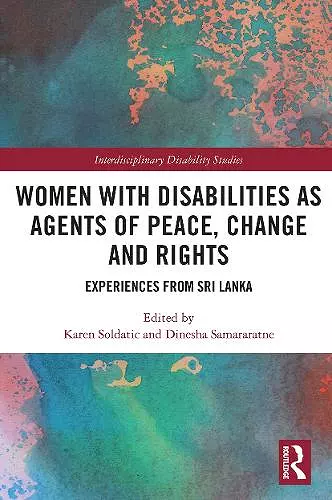Women with Disabilities as Agents of Peace, Change and Rights
Experiences from Sri Lanka
Karen Soldatic editor Dinesha Samararatne editor
Format:Paperback
Publisher:Taylor & Francis Ltd
Published:29th Apr '22
Currently unavailable, and unfortunately no date known when it will be back
This paperback is available in another edition too:
- Hardback£145.00(9781138085244)

Drawing on rich empirical work emerging from core conflict regions within the island nation of Sri Lanka, this book illustrates the critical role that women with disabilities play in post-armed conflict rebuilding and development.
This pathbreaking book shows the critical role that women with disabilities play in post-armed conflict rebuilding and development. Through offering a rare yet important insight into the processes of gendered-disability advocacy activation within the post-conflict environment, it provides a unique counter narrative to the powerful images, symbols and discourses that too frequently perpetuate disabled women’s so-called need for paternalistic forms of care. Rather than being the mere recipients of aid and help, the narratives of women with disabilities reveal the generative praxis of social solidarity and cohesion, progressed via their nascent collective practices of gendered-disability advocacy.
It will be of interest to academics and students working in the fields of disability studies, gender studies, post-conflict studies, peace studies and social work.
"This book upends common portrayals of disabled women - from passive recipients or victims to agents of change in post-conflict settings. Using the stories of diverse Sri Lankan women and foregrounding gendered and disability injustices, the compelling narratives demonstrate how disabled women’s activism has changed the peace-building context in Sri Lanka. In building networks and coalitions to address their needs and aspirations, Sri Lankan disabled women remind us of the importance of ‘nothing without us’."
Deborah Stienstra, Jarislowsky Chair in Families and Work, Director, Live Work Well Research Centre, Professor of Political Science, University of Guelph, Canada.
"A critical and timely intervention in the literature on both peacebuilding and disability studies, this book builds a comprehensive argument against locating women peacebuilders as a generic category by examining the specific role of disabled women in peacebuilding in Sri Lanka. In doing so it offers evidence and provocative insights from across scholarship, activism, life narratives and ethnic boundaries into the relationship of disability justice and postwar peace, collective mobilization and women’s agency. A compelling case study thereby emerges not only of the specific Sri Lankan context in relation to its war, the law, disability rights and challenges of post-war recovery, but also what peacebuilding means from a non-ableist perspective."
Neloufer de Mel, Chair Professor of English, Department of English, University of Colombo, Sri Lanka.
"Using intersectional and agency perspectives in Post war Sri Lankan context, this book contributes significantly to the growing gender and disability literature in the global south. Empirically underlining the challenges of individual and collective activism of women with disabilities in peace making, it provides useful recommendations for public policy. A must read."Nilika Mehrotra, Professor, School of Social Sciences, Jawaharlal Nehru University, New Delhi, India.
"This book upends common portrayals of disabled women - from passive recipients or victims to agents of change in post-conflict settings. Using the stories of diverse Sri Lankan women and foregrounding gendered and disability injustices, the compelling narratives demonstrate how disabled women’s activism has changed the peace-building context in Sri Lanka. In building networks and coalitions to address their needs and aspirations, Sri Lankan disabled women remind us of the importance of ‘nothing without us’."
Deborah Stienstra, Jarislowsky Chair in Families and Work, Director, Live Work Well Research Centre, Professor of Political Science, University of Guelph, Canada.
"A critical and timely intervention in the literature on both peacebuilding and disability studies, this book builds a comprehensive argument against locating women peacebuilders as a generic category by examining the specific role of disabled women in peacebuilding in Sri Lanka. In doing so it offers evidence and provocative insights from across scholarship, activism, life narratives and ethnic boundaries into the relationship of disability justice and postwar peace, collective mobilization and women’s agency. A compelling case study thereby emerges not only of the specific Sri Lankan context in relation to its war, the law, disability rights and challenges of post-war recovery, but also what peacebuilding means from a non-ableist perspective."
Neloufer de Mel, Chair Professor of English, Department of English, University of Colombo, Sri Lanka.
"Using intersectional and agency perspectives in Post war Sri Lankan context, this book contributes significantly to the growing gender and disability literature in the global south. Empirically underlining the challenges of individual and collective activism of women with disabilities in peace making, it provides useful recommendations for public policy. A must read."Nilika Mehrotra, Professor, School of Social Sciences, Jawaharlal Nehru University, New Delhi, India.
ISBN: 9780367560720
Dimensions: unknown
Weight: 172g
122 pages